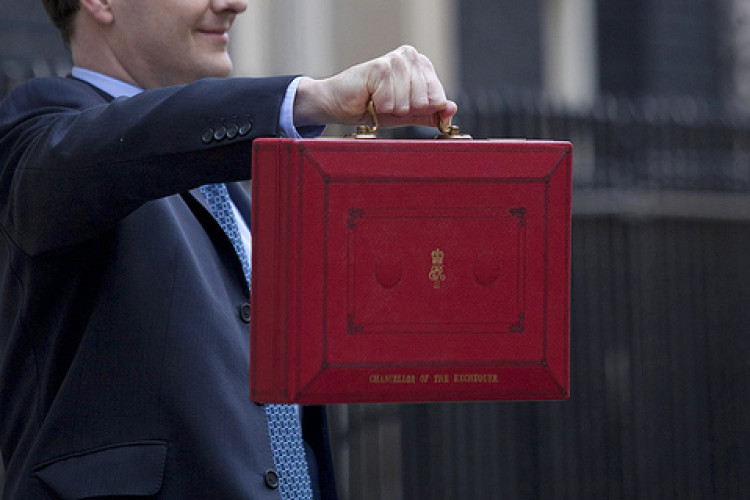Julia Evans, chief executive of the National Federation of Builders: “The NFB welcomes recognition of the contribution of smaller builders with the creation of the £500m Builders Finance Fund. The Help to Buy: equity loan scheme’s adoption has stimulated the market in the lower priced regions of the Midlands, northeast and northwest and we anticipate the new fund will do the same, while unlocking stalled sites and making access to finance simpler. We look forward to receiving more details on how further changes to the planning system will support the construction of the 200,000 homes Osborne mentioned in his statement.
“However, it was disappointing not to hear any announcements on boosting retrofit measures, which would have helped people to improve their homes and bring down energy bills. The chancellor should not only fix the roof while sun is shining but should have made sure it is insulated by providing additional support through a VAT cut on retrofit measures from 20% to 5%.”
Amit Bhatia, chairman of Hope Construction Materials: “With construction regularly used as a barometer of the economy the Right to Build policy should see significant growth in house-building and with it the industries that provide the materials to do so. The £500m Builders’ Finance Fund should also kick start regeneration of social housing, leading to increased supply and with it growth.
“I welcome the Planning Court approach to fast-tracking big industry planning disputes, such as those in construction. The industry is already suffering from rising regulatory costs for operators and anything which will quicken the process and remove the red tape is something which should be applauded.
“The £85m increase in apprenticeship investment is also good news and as the head of a business which has a strong focus on getting more young people into a profession, I believe it is something which will see real, long-term gains to employment.
“A number of new construction projects including a £270m UK Guarantee for the Mersey Gateway have been announced and as a firm believer that the industry has turned the corner I welcome more British based projects in the coming years to continue this revival. Similarly the £140m pledged to repair and maintain flood defences once again sees a focus on manufacturing.
“The news that the government will continue to compensate energy intensive industries for higher electricity prices is also welcome. This energy is being used to create things and drive the economy and making this more affordable for British manufacturers can only help output in the long-term.
“This is a positive budget aimed at ensuring sustainable growth and one which I welcome from a core industry perspective.”
Dr Nelson Ogunshakin, chief executive of the Association of Consultancy & Engineering: “While this budget may have lacked the big, eye-catching announcements on infrastructure that we have gotten used to around the autumn statement, there was still plenty with which the industry could be pleased.
“An additional £140m of funding for the repair of flood defences and potholes is welcome, as is the news that the house building sector will be boosted by the extension of ‘Help to Buy’ to 2020 and a new ‘Builders Finance Fund’ for SME developers. The Apprenticeships Grant for Employers scheme will also receive an extra £170m over the next two years, which will go a long way towards producing the next generation of engineers, urgently required to deliver future infrastructure.
“Though these measures might seem modest, their impact will be very keenly felt by the construction sector and help immeasurably to build the resilient economy of which the chancellor spoke.”
Iain McIlwee, chief executive of the British Woodworking Federation: “It was a mixed bag budget, with political positioning front and centre. Help to Buy is a help to build, but it’s not enough – to make a difference we should be looking seriously at public owned housing options. Support for business investment is also welcome, but we are not encouraging investment in our housing stock. Again, the Green Deal didn’t get a mention, nor the option to reduce VAT on refurbishment and repair work, which at 20% still acts as a disincentive and a dampener on the domestic RMI sector.
“There is significant support in the budget for high energy users, but little encouragement for more environmentally sensitive sectors. And I worry about the broad brush approach to exporting. We must remember that only a small proportion of manufacturers are exporting. This can grow, but it starts by nurturing all manufacturers, and from this base stronger companies will emerge to export. Right now, for many manufacturers the challenge of competing with imports outweighs the opportunities that exports are providing. Unfortunately this was overlooked by the chancellor.”
Dr Diana Montgomery, chief executive of the Construction Products Association: “First, having highlighted the need for government clarity around its plans to support house building, we are pleased that the Help to Buy scheme has been extended to 2020. We have already seen this have a real impact on the ground in generating new starts, and are confident that this greater medium-term clarity will further incentivise builders.
“Second, we are encouraged by the recognition that infrastructure is part of a successful economy, with the short-term support for projects such as guarantees for the Mersey Gateway Bridge, £140m for damaged flood defences and £200m for pot-hole repairs. More importantly, however, government must focus on delivery of its existing project pipeline and getting spades in the ground, a critical challenge given the recently disappointing ONS figures showing a drop in infrastructure output and new orders.
“The government further recognises the need to make the UK an attractive place for manufacturing investment, and to that end it was important to hear the Chancellor offer support to energy-intensive manufacturers with a £7 billion package, including the cap on the carbon price floor until the end of the decade, along with new compensation for the rising costs of the Renewable Obligation and the Feed-In Tariffs.
“Finally, we were pleased by plans – which exceed our recommendations – to double the annual investment allowance to £500,000 and extend it to the end of 2015, benefitting millions of SMEs. The government will need to think bigger, however, if it wants to attract significant investment into the UK from major multi-nationals.

“All of this was good news for UK plc and our members; however, what was starkly missing was any indication that energy efficiency was relevant to the future of the UK’s built environment. We continue to press the government to recognise the tremendous potential for improving the housing and commercial building stock, and thereby not only back British builders and manufacturers but also improve the cost of living for home owners.”
Stewart Baseley, executive chairman of the Home Builders Federation: “All the indicators show a significant increase in house building in recent months. The measures announced, in particular the extension of the Help to Buy Equity Loan scheme, will enable the industry to increase output in a sustained manner.
“Extending the Help to Buy Equity Loan scheme is a very positive move. It will mean more homes are built, allow builders to get on with planning their businesses and employ the people needed to help tackle the country's housing crisis. Help to Buy has reinvigorated the home building industry, contributed to a sharp increase in new housing starts and allowed thousands of First-Time Buyers and second-steppers onto the housing ladder. This in turn has seen the industry recruiting thousands of staff, including apprentices, so providing an economic boost to the country.
“We very much welcome the commitment of money for small and medium-sized builders, a move HBF proposed to government. A lack of development finance has been the biggest constraint faced by smaller companies. The fund will allow them to increase their output, so adding to the overall supply of homes and number of jobs created.”
David Mann, executive partner of building consultancy Tuffin Ferraby Taylor: “The measures announced in today’s budget, such as the extension of help-to-buy, only focus on increasing demand for new homes. However, severe supply constraints are limiting the construction industry’s capacity. The gap between rising demand and the lack of supply of new homes to fill it will add to further house price increases, particularly in London and the South East.
“Supply constraints arise from the fall out of the downturn. There is a skills shortage owing to retrenched skilled workers being permanently lost to the sector, who have not yet been replaced. This is combined with a backlog of planning applications arising from slimmed down local authority planning departments. Added to this are shortages and long delivery lead times of materials such as bricks and tiles as manufacturers permanently closed or mothballed plants across Europe and the UK. The increased demand and lack of supply of these basic building materials is pushing the cost of construction upwards too.”
Ian Liddell, head of development at consulting engineer WSP: “Any measures to support house building are of course welcome, but today’s Budget announcement of provisions for 200,000 new homes falls short of demand for the coming year and must be seen as platform for other increases in years to come. Extending the help to buy scheme until the end of the decade will help ensure the housing market recovery continues and spreads beyond London, but the real issue is delivery, specifically the capacity of the industry and its supply chain to deliver on projects.
“In terms of garden cities, the creation of a development corporation for Ebbsfleet is positive but early evidence of genuine progress is very important if this is to be a pilot for other garden cities to be brought forward. The benefits of this approach should be evaluated against real housing delivery; it will be interesting to see if it can be an effective model.”
Dave Sheridan, CEO of Keepmoat: “Help to Buy has created a welcome stimulus to housing and made a positive economic impact on communities around the country by encouraging home ownership. As a specialist in high-quality entry-level housing, Keepmoat’s buyer profile fits perfectly with the purpose of Help to Buy, so we very much welcome the extension to 2020.
“Since its launch, we have sold a total of 998 houses through Help to Buy – with 751 of these homes sold to first-time buyers with an average age between 25-30, and an average sale price of £115,500.
“As a company, we are looking forward to one of our best ever years as we experience double digit growth in house construction. Over the 2014/15 financial year, Keepmoat plans to build more much needed new build houses – volumes will be up by 30 per cent this year to 2,000 homes.
“The extension of Help to Buy will give the house building industry more confidence to plan ahead for the next six years so we can now begin to think about hiring more staff to build more homes and investing in apprentices. As a result, we are looking to increase our number of apprentices by 50%, by employing at least another 100 apprentices over the next 12 months.”
Mark Perkins, chief executive of Shepherd Group Built Environment: “The government commitment to building a new 15,000 home garden city and the welcome extension of the Help to Buy scheme to 2020 represents a now-or-never opportunity for the construction industry to take the reins and shape the economic future of the UK.
“And while these bold headline grabbing announcements will dominate the news agenda, it is now up to the government to invest in and support the construction industry so that we are truly ready to deliver on these ambitious targets and contribute towards Mr Osborne’s vision of a ‘resilient economy’.
“The chancellor’s pledge to invest a further £6bn into the Help to Buy scheme, which he predicts will contribute towards more than 200,000 new homes across the UK, will further stimulate the built environment sector if this is aligned with much-needed, widespread infrastructure investment and close consultation with the industry. The key here is to ensure that government uses the advice from the OBR and takes responsibility for keeping the incentive in place without unbalancing the economy.”
Chris Temple, PwC UK engineering & construction UK lead: "House building needs a significant push, so it is good to see the £500m investment into small house building firms, which has obvious employment connotations too. However, space is at a premium, especially in London and the south-east, where the chancellor identified a specific need for new housing. To really kick-start the industry, I would like to see greater incentives for public and private landowners to sell sites to developers.
"There was a definite focus on first-time buyers in this budget announcement, with plans for 200,000 new homes to be built nationally meaning good news for those interested in the Help To Buy scheme, both developers and purchasers. The confirmed new garden city in Ebbsfleet will be of great appeal to young professionals looking for a property in the commuter belt. The £150m investment for people to build their own homes works well in parallel to the Help to Buy scheme – perhaps now people looking to get onto the property ladder will consider buying a plot at auction and starting from scratch?"
Got a story? Email news@theconstructionindex.co.uk



